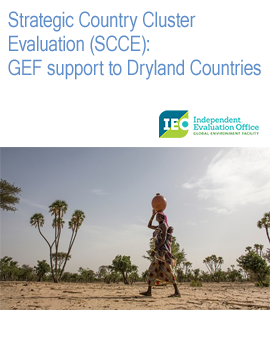Drylands cover over 40 percent of the earth's land surface and are home to more than two billion people, 90 percent of which reside in developing countries. Countries with a high share of drylands face comparable land-based environmental challenges including water scarcity, high climate variability, desertification, land degradation and drought. These countries also face challenges to human well-being in terms of health, food security, nutrition, livelihoods, social relations and security, all of which is at risk from dryland degradation. The GEF has invested a substantial share of its funding in the sustainable management of drylands, reaching 11 percent of the total GEF-4 to GEF-7 financing.
This Strategic Country Cluster Evaluation provides country-level evidence on the performance of GEF interventions focused on environmental issues related to drylands in countries with a large drylands' extent. It assesses the relevance and coherence of GEF investments in dryland countries, as well as GEF results and sustainability in terms of environmental benefits and associated socioeconomic co-benefits. Gender, resilience and private sector are assessed as cross-cutting issues.
The GEF Council is the primary audience for this evaluation. The evaluation's evidence also informs GEF Agencies' proposal development and GEF Secretariat's appraisal of project proposals. Country- and non-governmental partners engaged in project and program design and implementation form the secondary audience.
